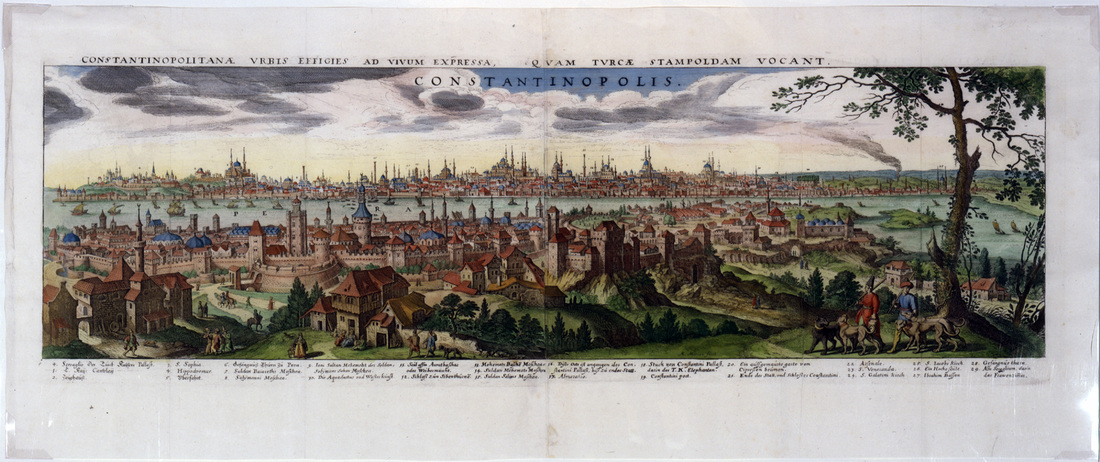 View of Constantinople for Pera, 17th century. Since I wrote last, I have spent some time in Constantinople and I feel that I must tell you about it! There are so many people here in Pera, and so many who write about Constantinople who have never even seen the city, staying only in Pera, Tophana, and Galata, the Frank Christians areas, even though it is only separated by a sea not half as wide as the Thames at its widest. And yet the won't go.
The women would have to cover their faces, which they are averse to, and while, they do wear veils in Pera, it is only to accentuate their beauty. I think the French Ambassadors will leave without ever even seeing it. I have gone there many times int this journey, they veil has become easy and agreeable to me, and even if it wasn't, it's worth a little inconvenience for the experience. The city sits on the European side, situated on seven hills and with the perfect mixture of gardens, pine and cypress trees, palaces, mosques, and public buildings, raised up above each other. The symmetry of it all makes me think of a perfectly organized cabinet. I have seen the Seraglio, an enormous but slightly irregular palace, and St. Sophia, which was extremely difficult to seem [1]. I had to send my request to the Caimaicam, the governor, three times, and then he met with the chief effendis, and then asked the mufti whether it was ok, before I was finally given permission. I'm not sure why the Turks are so much more delicate on this subject than Christians, but I can only imagine that, because the structure was once a Christian Church, they fear that people might profane it with their prayers, especially to the saints as their images still appear in the mosaics in the building (contrary to what some other writers have said, the images were NOT defaced by the Turks). The dome at the top of the building is said to be 113 feet in diameter and is held up by 2 pillars of solid marble. I also saw the grave of Emperor Constantine, which was great revered by my guides.
I think I enjoyed seeing the Turkish mosques better though. The Sultan Soliman's is one of my favorites. The mosque and grounds are perfectly square with four large towers and the large cupola is supported by beautiful marble pillars. Under the great cupola is a fountain covered with colored pillars. On one side is the pulpit, which is made of white marble, and on the other, there is a little gallery for the Grand Signor. At the upper end is a sort of altar and the mosque lit by a large number of lamps. Many of the mosques in the area of very similar in their layout. I also saw Validé's, the first mosque built by a woman and seriously the most beautiful structure I've ever seen! Between us, I think St. Paul's would look pretty pitiful next this: 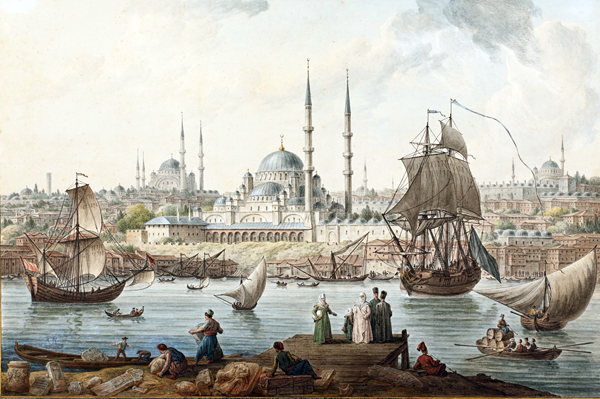 Yeni Camii and The Port of İstanbul by Jean-Baptiste Hilair. Late 18th Century Just as any of squares would next to Alterdan, or the place of the horses, the Hippodrome in Ancient Greek times. There is a large column with three twisting snakes and the obelisk brought from Egypt in this square. Really there's not much else worth seeing besides Sancta Sophia. Although Sultan Achmet's mosque is also nice with its brass gates! 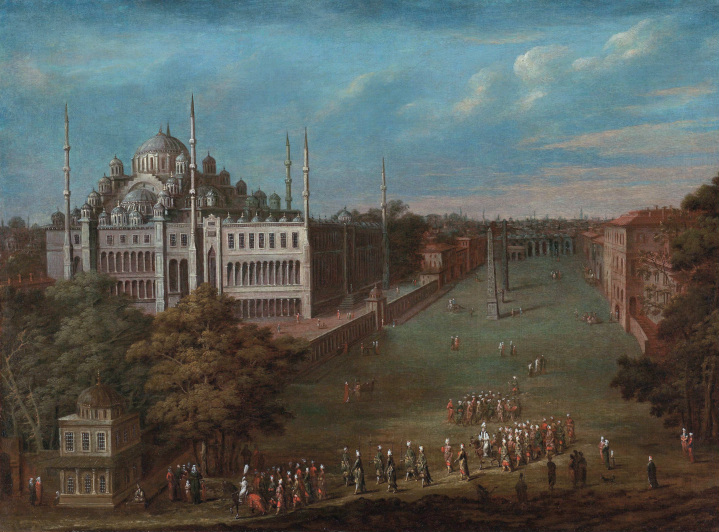 The Grand Vizier is crossing the Atmeydan Square, Jean Baptiste Vanmour The exchanges are all very noble looking buildings, full the alleys, each one dedicated to a different trade. It's pretty similar to the New Exchange at London. The Bisisten, or jewelers quarters, is full of extraordinary diamonds and precious stones! Now, I know you expect me to discuss slavery, but the Turks seem to treat them very humanely and is, in my opinion, no worse than servitude all over the world. True, they aren't paid, but what they are given yearly in clothes amounts to more than a regular servant makes in England. Now I know you're thinking that men will buy women with bad intentions, but, again in my opinion, this seems to be done as publicly and more infamously in our Christian cities [1]. The only pieces from antiquity I have seen are the aqueducts, which might even be older than the Greek Empire! The other public buildings are mostly hans and monasteries, of which I saw one. The men there are permitted to marry, but only wear a coarse white cloth wrapped around them for clothes. The order doesn't seem to have too many rules beyond performing rites on Tuesday and Friday, during which they meet in a large hall, starring at the ground with their arms folded while the Imam or preacher reads from the Alcoran. When this is over, a number of them play music, which is then followed by a short speech on what was read. Finally, they sing and play until someone begins a dance that lasts about an hour. It is all done very seriously and they seem devoted to their contemplation. As weird as this might sound, there was something very touching about their air of submission and the level of seriousness.Sorry for going on so long! More soon!
Hey everyone! You’ve all been asking to see this and finally I’ve got one for you: A Turkish Love Letter! The first object is a pearl,” Ingi in Turkish, and its meaning appears next to the word:
| Ingi,
Pearl,
Caremfil,
Clove,
Pul
Jonquil,
Kihat,
Paper,
Ermus,
Pear,
Jabun,
Soap,
Chemur,
Coal,
Gul
A rose
Hasir,
A straw,
Jo ho,
Cloth,
Tartsin,
Cinnamon,
Giro,
A match
Sirma,
Goldthread,
Satch,
Hair,
Uzum
Grape,
Til,
Gold wire,
And, by way of postscript:
Beber,
Pepper
| Sensin Uzellerin gingi
Fairest of the young.
Caremfilsen cararen yok
Conge gulsum timarin yok
Benseny chok than severim
Senin benden, haberin yok.
You are as slender as the clove!
You are an unblown rose!
I have long loved you, and you have not known it!
Derdime derman bul
Have pity on my passion!
Birlerum sahat sahat
I faint every hour!
Ver bixe bir umut
Give me some hope.
Derdinden oldum zabun
I am sick with love.
Ben oliyim size umur
May I die, and all my years be yours!
Ben aglarum sen gul
May you be pleased, and your sorrows mine!
Oliim sana yazir
Suffer me to be your slave.
Ustune bulunmaz pahu
Your price is not to be found.
Sen ghel ben chekeim senin hargin
But my fortune is yours.
Esking-ilen oldum ghira
I burn, I burn! my flame consumes me!
Uzunu benden a yirma
Don't turn away your face.
Bazmazum tatch
Crown of my head!
Benim iki Guzum
My eyes!
Ulugorum tez ghel
I die — come quickly.
Bize bir dogm haber
Send me an answer.
| As you can see, there is hardly any object that does not convey a message! [1]
You may be wondering how I’ve learned so much, but I’ll admit, it comes at a cost: I’m beginning to lose my English! In Pera, they speak Turkish, Greek Hebrew, Armenian, Arabic, Persian, Russian, Slavonian, Wallachian, German, Dutch, French, English, Italian, Hungarian and even within my family, my grooms are Arabic, my footmen are French, English, and German, my nurse is Armenian, my housemaids are Russian; many of the servants are Greek; my steward is Italian; my janissaries are Turks—I feel like I live in the Tower of Babel!
Many people can speak all of these languages without even knowing how to read or write and I’ve seen infants who are learning at least 3 or 4 language. It kind of makes English ladies who call themselves ‘accomplished’ for just having a superficial knowledge of French of Italian look much less extraordinary, doesn’t it? Of course, I still prefer English, even as I’m losing it…but I’m missing so many words I can’t even think of a clever ending for this blog! Oh well, more soon!
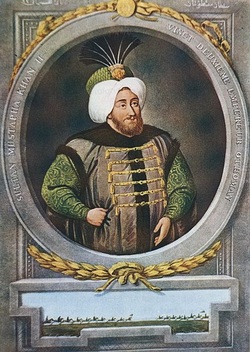 Mustafa II, 1695-1703 the Ottoman Sultan Mustafa II, 1695-1703 the Ottoman Sultan Welcome Mary Wortley Montagu, born January 19, 1718! I have to say, giving birth wasn’t half as mortifying here as it is in England. No one bothers laying in for an entire month and I was up and visiting friends again in three weeks time!
Just a few days ago, I went to visit Sultana Hafise, the favorite kadin of the last Emperor, Mustapha, who was deposed by his brother and died shortly after (they think he was poisoned!). The Sultan then forced her to marry, even though she begged him not to make her as she had vowed she would never sleep with another man. To prove her point, when she was forced to choose, she picked the secretary of state who was over 80 years old. Beyond his age, she chose him because he was the one who brought her to the former emperor. She is still in mourning today and could not talk about him without tearing up...
She was quite beautiful, though not nearly as beautiful as Fatima. It was her dress was what really stood out. She wore a vest called a dualma, which has longer sleeves than the caftan. It was purple and lined with pearls, with large gold loops as buttons. The whole things was tied with two large tassels of smaller pearl and the arms were lined with diamonds. She had three long necklaces on, one of pearl with a an emerald as big as a turkey egg! Her earrings eclipsed everything else though—two pear shaped diamonds the size of hazelnuts. She had four strings of pearls each as large as the Duchess of Marlborough’s! And her rings were the largest diamond rings I’ve ever seen (except for Mr.Pitt’s of course).
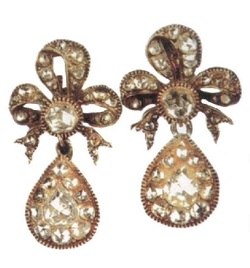 Not quite as nice as the Sultana's Not quite as nice as the Sultana's
but you get the idea! We had a beautiful dinner, and the display on the table was equally as lovely as her dress. The napkins were so nice; I didn’t even want to wipe my hands on them! After dinner, we had coffee in gold soucoupes. Her home was equally as richly decorated as the table. Even her servants were dressed in gold.
Now I know you’re going to say that this sounds made up, like I copied right out of the Arabian tales, but this is what I actually saw! We travel bloggers have a hard time, we we only say what’s been said before we’re boring, but if we say anything new, suddenly we’re exaggerating and romanticizing what we see, so much so that should I come home, I won’t even discuss what I’ve seen with anyone.
I went to see Fatima yesterday as well, and if you don’t believe my descriptions above, you’ll never believe what I’ve seen in her palace! The Sultana was nice, but the grace and manners of court come so naturally to Fatima, she immediately inspires respect and tenderness and now that I am learning her language and can talk to her, I find her wit equally as charming! The servant I had with me couldn’t believe she was a Turkish Lady and thought she must be a Christian (and as it turns out, her mother is). I had to tell her what a stir her beauty would cause in London! And she, in her infinite sweetness, replied that if England valued beauty as much as I say they'ed never have let me leave!
This blog is getting way too long, so I’ll stop here before a turn into a downright storyteller. It may be a proverb that knowledge is no burden, but knowing too much will still most likely make us troublesome to other people…
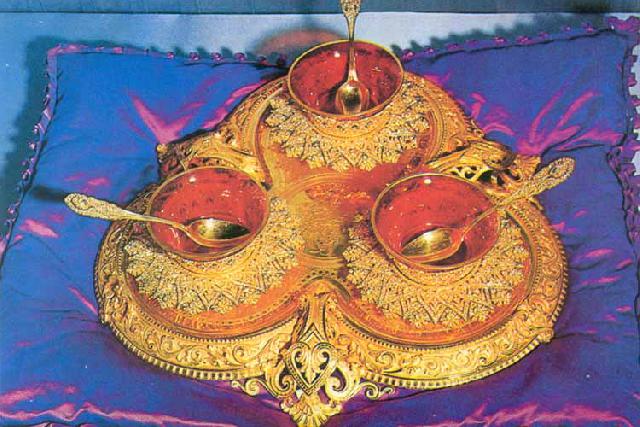 Gold encrusted with diamonds, composte service, Topkapi Museum.
Back in Pera, Constantinople. Not much of consequence to write about lately, as I’ve been preparing for the newest addition to our family! It’s a bit unnerving to be preparing for this so far from home, but mother’s here are so greatly respected that I can’t help but feel some of that respect myself. On the hand though, women without children are really looked down upon. It seems it's better to be an unwed mother than a married woman without children!
The women go to extremes to prove that they are not past childbearing age and often kill themselves in the process. In fact, all the women I’ve met who have been married 10 years have close to 12 or 13 children each and when they’re pregnant, they pray for twins. I asked some of my friends here how they can care for so many children, they simply explain that many are likely die before growing up (which I guess does happen often). But they don’t seem to care, giving birth is enough to satisfy their vanity. I’m afraid I will remain very English in this area…
But now that I’ve discussed what you want to read about, I have to brag a little about the beautiful weather! I'm quite fond of the climate: while you huddle next to your heaters at home, I’m sitting in the sun, feeling the warm breeze, and enjoying fresh cut flowers from the garden. I’m also quite fond of certain aspects of Turkish law. Here, anyone convicted of lying is burnt on the forehead with a hot iron. I wonder how many English “gentleman” would have to grow their hair out if we adopted this practice at home… ;)
I’d say more but I must go see the midwife!
I hope that you all have been getting my emails! The wifi has been iffy, though I did receive yours Mr. Pope, and you’ll be happy to know that, no, I am not dead and buried, although at times I feel I like I might as well be I care so little about what goes on at home. The heat of the city has driven us off to Belgrade Village, where I’m blogging from now. It’s very beautiful here and I feel so disconnected from what’s going on in the world I really might as well be a ghost. Although I do miss my friends, the things they tell me about home don’t excite me in any way and I can’t seem to care about the same old drama. As an admirable author once said:
That spirits departed are wondrous kind
To friends and relations left behind:
Which nobody can deny. [1]
Truth be told, I sometimes I really get tired of all the singing, and dancing, and sunshine (yea right) but I always try an persuade myself that I’m better off than you at home…
I spend my week reading English; studying the Turkish language, (which I am awesome at!) and classical authors; writing; sewing; seeing visitors, and listening to music-- a much better use of my time than, sitting drawing rooms and listening to all the same gossips and scandal, seeing the same follies acted over and over.
But of course, Mr. Pope, this apathy does not extend to you and I hope that you remember me, even though I'm dead to the world…Now, to my dear ladies, I'm sorry, but I can’t help but laugh at the outrageous things you're all are asking me! No, I will not be buying anyone a slave. The slaves kept here are brought up from a young age and very carefully educated to serve their ladies. Their patrons rarely sell them except as punishment for an extreme mistake, so they do not face the markets, and if they ever get tired of them, they give them to a friend or free them.
I know that this is not what you expect to hear and that the stories in England don’t sound like this at all, but you’ll have to take my word for it, because I’m here and I'm telling you the truth. All of you with your questions and assumptions are completely ignorant about what life is like here and it’s clear that you’ve derived your ideas from Dumont’s own ignorance. Really, reading these travel accounts is quite entertaining. They never fail to discuss women, which they definitely have not seen in their travels, speak of great men who they could never have gotten an audience with, and describe mosques which they were too afraid to even peep into.
Anyway…
I finally tried this Balm of Mecha (it’s hard to get but I’ll try and send some home soon!) and it made me break out like crazy! So be warned if you’re going to try it! Though, if we judge it’s effectiveness by the women here, it must be working; their skin is flawless.
Funny though, the women here seem to have quite a different way of getting noticed by men than looking good (which is what we do at home)—they pretend to have a magic, secret knowledge that gives them control over others. I couldn’t help but argue this point with one Lady, explaining that there’s no magic in a man playing the fool for a woman…but its no use, they all firmly believe in this power. Oh well, until next time!
The weather has been beautiful so far on our journey. The road was full of the great Sipahi, but nothing really happened worth relaying until we reached Ciorlu, where we lodged in a conac, or small seraglio. I did some serious exploring of all the women's apartments here, which are in the middle of a thick copse of trees, and found the walls to be covered with poetry, written by the women, little distiches penciled in by hand. 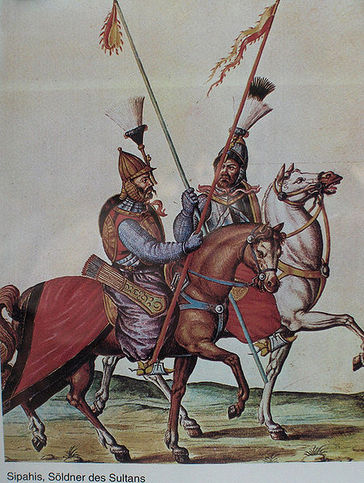 Sipahi at the Battle of Vienna, 1642 As we rode on we passed an ancient Greek church, which seemed pretty poorly built and less richly decorated than the Roman Catholic church, but the most celebrated Madonna in Italy could not be more famous for her miracles than this church!
We stayed that night at Bujuk Cekmege, or Great Bridge; and the next, at Kujuk Cekmege, or Little Bridge. We stayed in a former monastery that now belongs to a hogia or schoolmaster. I asked him to show me his own home, and he pointed to a treehouse he had built for himself and his family at the top of tall cypress! I wanted to take a closer look, but realized I'd probably break my neck on the climb.
Finally, we made it to Constantinople the next day; but I haven't had much time for exploring yet –I've had so many visits to make over the last few days. We are staying in Pera, (which is no more a suburb of Constantinople, than Westminster is a suburb to London). 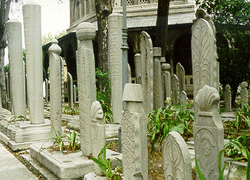 Cemetery on the grounds of the Cemetery on the grounds of the
Süleymaniye mosque A certain French author says, Constantinople is twice the size of Paris. Mr W—— is claims its no bigger than London, though it looks bigger to me, but maybe not quite a populated. The cemeteries themselves are larger than the entire city, I've seen some a few miles long. No graves are ever moved and so land the size of villages becomes devoted to burying the dead. For each grave a pillar is set up and a turban indicating the profession or position of the person is carved into the top. Women have a simple pillar with no carvings or decorations, except those that died unmarried who have a rose at the top of the pillar.
When I wrote earlier about religion, there were a few things I forgot to mention but I wanted to discuss now because they seemed a little unbelievable to me. First, did you know that when a man divorces his wife he can get her back (legally) by simply permitting her to sleep with another man? I know some people who actually choose to do this rather than loose their love entirely. Second, I've learned that a woman who dies unmarried is believed to die in a state of reprobation. As a woman's purpose is to create and multiply, she is only doing what God expects when she is having or taking care of children. Of course, our vulgar misconception that they believe women do not have souls if completely false, though women's souls are seen as inferior to men’s and unable to get into the same paradise reserved for them. There is a “place of happiness” dedicated entirely to the souls of the inferior where all good women may have eternal bliss. Many of the women are superstitious and are afraid to remain a widow for more a week for fear of dying in a useless state. Those that enjoy being free of a husband and are not as strict in their beliefs, just wait and marry when they start to become afraid of dying. This seems very different than the idea that nothing is more acceptable to God than a vow of constant virginity. I'll let you decide which is more traditional...
I can't tell you anything else yet, but once I've done some exploring, you'll hear from me!.
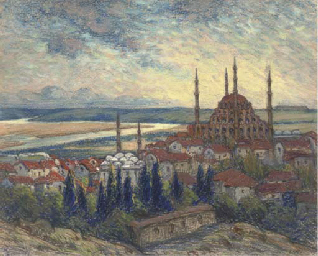 Sultan Selim Mosque I’ll be leaving Adrianople soon, but I have to tell you a bit about what I experienced here first.
I went to the market in my Turkish clothing. There were so many janissaries, but they don’t dare to be rude. They made way for me and were really respectful. The market was about a half mile long and very neat. It has 365 shops which sell all kinds of goods and are sold in the same way as the New Exchange in London. Some people just like to walk around the market, others just hang out and drink coffee.
I noticed that most of the rich tradesmen were Jews, who actually have a lot of power in Turkey. They’re essentially in charge of all of the trade in the Empire. Every bassa has a Jew who does all his business for him. These men are the physicians, the stewards, and the interpreters. I think you can tell that they’ve made themselves so necessary that the court protects them no matter what. Many of them are really rich but avoid showing that off in public…although their houses are super luxurious.
Then I visited the encampment of the soldiers. The Sultan has already gone to his tents. The tents seem more like palaces! They take up so much room and are split into various apartments. They’re all green and the bassa’s tents are adorned with three horse tails, indicating their rank [1]. The ladies here ride their coaches to see the camps just like our ladies did in Hyde Park [2]. It’s clear that the soldiers are not happy though; most people are not fond of the war, especially the tradesmen.
Anyway, I went to see the Mosque of Sultan Selim the 1st. I was dressed in Turkish clothing and was easily admitted. Although the doorkeeper showed me around so I assumed he knew I wasn’t from around here. The gates to the mosque are made of colorful, marble pillars and the roof is divided into separate domes with gilt balls on the top. I don’t really know much about architecture so I won’t pretend I can speak of proportions! But it seemed to me like the noblest building I ever saw. To be honest, it’s better that it’s not divided into pews or its pillars decorated by cheap images like the Roman Catholic churches, which look like toy shops! In one of the corners is a little gallery set aside for the Grand Signor. The outside of the mosque is adorned with four, vast towers from where Imams call people to pray.
I visited other mosques too but none of which were as magnificent as this one. It is beyond any church in Germany or England.
Anyway, I haven’t told you anything about my husband’s affairs and who he sees here because it’s always the same, so I won’t bore you with redundancy. But when the Sultan gives audience, his 11 year old son, the young prince, always sits near him. He is adorable but will most likely not succeed the Sultan because he has two older brothers. Everyone’s hope lies in the eldest son. This reign has been so bloody an awful, that I think everyone is happy to see it end. Anyway, I’ll be writing again soon once I’m in Constantinople!
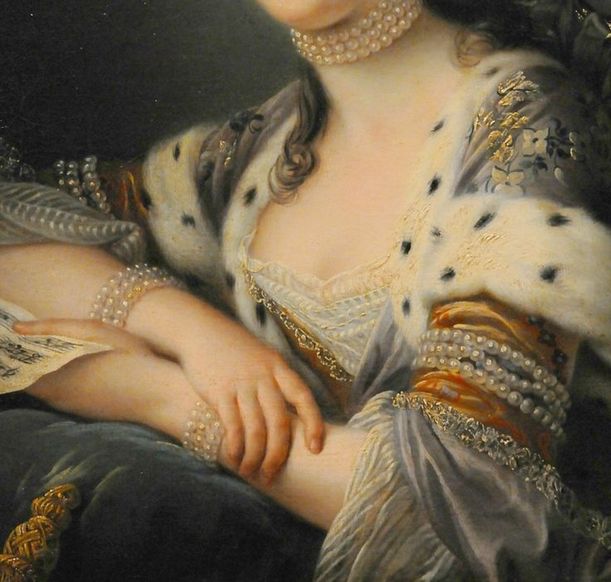 Portrait of a woman in Turkish costume. My head is so filled with everything that happened yesterday that I have to let it out! I was invited to dine with the Grand Vizier’s lady; no Christian has ever been invited for such an event. I decided that I wouldn’t satisfy her curiosity (which I bet was the point of her invitation) if I wore a traditional Turkish dress; so instead, I dressed like the women in the court of Vienna do. I went in a Turkish coach and was attended only by the woman who held my train and the Greek lady who was my interpreter. I was met by a black eunuch who helped me out of the coach and led me through several rooms where the slaves were sitting. They were dressed really nice too.
The lady was sitting on a sofa in a sable vest. She walked over to meet me, and introduced me to a dozen of her friends. She seemed really sweet and looks about fifty years old. I was so surprised to see that there’s really nothing grand in her house. The furniture was pretty modest and aside from the number of slaves she has, nothing about her seemed expensive. She totally knew what I was thinking because she told me that she no longer cares to spend her time or money on materialistic things, and that she's just concerned with charity and praying to God.
She was really hospitable and we talked until dinner was ready. Dinner was served one dish at a time. They use really rich spices in their food and the soup is served last. I felt bad that I couldn’t eat as much as the Lady wanted me to; she was so eager to serve me all kinds of food. At last, they served coffee and perfume, which is basically a sign of respect. The slaves kneeled and sprayed perfume in my hair, clothes, and handkerchief. After this, the Lady made her slaves play instruments and dance. Soon after, we left.
But the night wasn’t over yet. We visited the Kahya’s lady. I’m so glad to have gone there because it was such a difference from the Grand Vizier’s home. Lady Fatima, the Kahya’s lady, was sitting on a sofa covered with pretty Persian carpets and leaning on cushions of white satin. Two young and pretty girls covered in jewels sat at her feet. But they were hardly noticeable in comparison to fair Fatima. I have never seen anything so ridiculously beautiful and no face could ever draw attention like hers. She stood up to say hello and put her hand to hear heart with such sweetness. Although my interpreter told me Lady Fatima is beautiful, I was so amazed by her beauty that I was speechless for a few moments. Oh my God, her features! Her charm! Her perfectly proportional body! Her complexion! Her smile! Her eyes, so large and black and soft! Every angle of her face is beautiful.
After I caught my breath, I tried to find some kind of flaw in her; after examining her for a little bit, I found nothing. Nature had made her more beautiful than what Apelles could have ever painted. The most beautiful English woman would vanish near her.
Lady Fatima was wearing a caftan of gold brocade flowered with silver. The caftan was fitted and accentuated just the right parts. Her arms were decorated with bracelets of diamonds and her belt was set with diamonds too. On her head she wore a pink and silver Turkish handkerchief and her black hair was divided into many tresses. On the side of her head she was wearing a bunch of gorgeous jewels. I think you’re going to assume I am exaggerating her description. I read somewhere that women speak in rapture when they discuss beauty, but I don’t understand why they shouldn’t be allowed to do so. I’m not ashamed to say that I looked at the gorgeous Fatima with such pleasure that the finest sculpture couldn’t have given me.
Her maids sat beneath the sofa and I couldn’t help but imagine a picture of the ancient nymphs. I didn’t think such a beautiful scene ever existed. Lady Fatima ordered them to play and dance. I’m sure that the biggest prude on earth would have looked upon them and thought things I shouldn’t say. When the dance was over, four slaves came into the room and sprayed the air with perfume. Then they served us coffee in the prettiest china. Lady Fatima was so sweet; she called me Uzelle Sultanam, or the beautiful sultana, and felt bad that she couldn’t talk to me in English.
When I left, she gave me a basket of embroidered handkerchiefs. I swear I felt like I was in Mahomet’s paradise. I don’t know how all of this sounds to you but I hope you’re as excited as I am!
I’ve arrived safely at the end of my long journey! I won’t tell you about how tiresome it was, I’m sure you’d rather hear something about what I saw here in Turkey instead; after all, a letter from Turkey that has nothing extraordinary in it would be disappointing! ;)
Let’s see, most of you have never seen camels in real life, so I guess the description of them will be new to you. I’ve seen a ton of pictures of camels, but none of them were even close to what I saw with my real eyes. Although I could be making a false observation here, I feel like they resemble stags; their legs, bodies, necks, and color look exactly the same. But they are a lot bigger and faster. They can out-run horses; in fact, they brought the first news of the loss of the battle of Peterwaradin to Belgrade. Anyway, they have humps on their backs, so it’s difficult to load them. They’re actually pretty ugly creatures with heads too large and disproportionate to their bodies.
The horses here are not put to labor, nor are they fit for it. They’re really gorgeous though and full of spirit. They’re generally little and not very strong, but they are swift. I have my own white horse now that I’d never part with! You should see how he prances under me with so much energy that I’m tempted to mount him but I’ve never rid a horse in my life. When the Turks saw my sidesaddle, they looked at it with as much wonder as the Americans must have looked at the ship of Columbus.
I have to tell you about the house I’m staying in. I’m sure you’ve heard that houses here are so miserable, but trust me, that's not the truth. I’ve visited many of the houses here, so I can definitely speak from experience. It’s true that they don’t usually decorate the outside of their houses, which are built of wood. But I don’t blame their bad taste for this; I blame the oppression of the government. Every house is at the disposal of the Grand Signor so people don’t see the point in spending much on their homes. Their main concern is to build a home that’ll last. Every home, big and small, is divided into distinct parts that are joined together by a narrow passage. They rarely build above two stories and their stairs are broad and not usually more than 30 steps. One part of the house belongs to the lord and the adjoining one is called the haram, which is the ladies’ apartment. The ladies’ apartment is more grand, being filled with paintings and furniture.
The rooms are all spread with Persian carpets. The sofas are laid with richer carpet, and all round it a sort of couch raised half a foot, which is covered with rich silk or whatever the owner desires. Mine is made of scarlet cloth with a gold fringe. Round this, against the wall, are extravagant cushions. They are generally brocade or embroidery of gold wire upon satin. There is nothing more gorgeous than this. The seats are so comfortable that I never want to sit in a chair again. The ceilings are usually low and always made of wood. There’s pots of perfume or baskets of flowers between the windows, but what’s most fascinating to me are the marble fountains in the lower part of the room that throw up spouts of water, giving a nice coolness to the room and a enjoyable sound. Each house also has a bagnio for either hot or cold baths.
The gardens, planted with high trees and beautified with fountains, are where the ladies spend most of their time, listening to music or embroidering.
You’re probably surprised at my descriptions, which are so different from what you have been told by the common voyage-writers, who like to talk about things they don’t know. It’s really rare that a Christian is admitted into the house of a man of quality, let alone the harams, which are forbidden ground. So, these travel bloggers can only speak of the outside because women’s apartments are out of sight.
Anyway, I think I have shared a lot of stuff with you for once. If you’re not happy with the topics I’ve chosen to talk about, let me know what you’d rather me blog about!
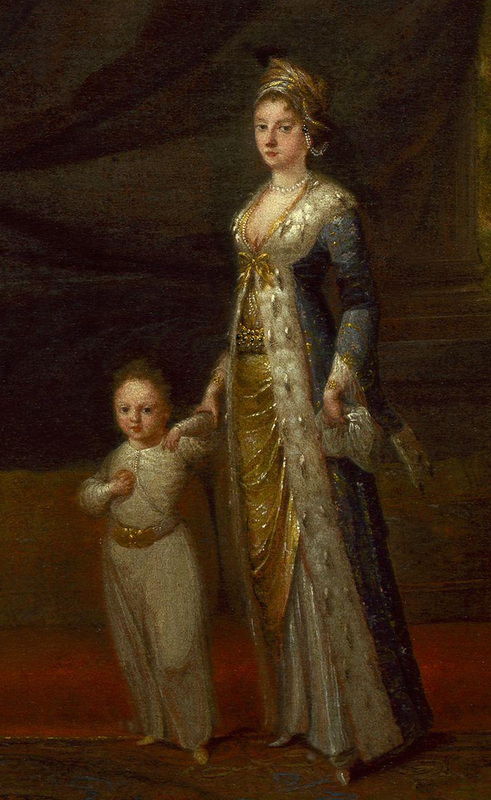 With my son, Edward. [1] Sarah, I should be mad at you for replying to my August email in December! I, on the other hand, have a good excuse for not having written back promptly. Traveling on land is so tiresome. But I am happier than you think I am and I am not lonely. Many Greek, French, English and Italians under our protection visit me often from morning till night.
There's barely any truth to the dreadful stories you've heard about the plague. There’s really little more to it than a fever; we passed trough two or three towns that are violently infected, but many people escape the plague and the air is never contaminated!
What I am about to tell you will make you wish you were here. The smallpox is so fatal and common in England, but it is entirely harmless in Turkey because of the invention of engrafting. Every September, a group of old women inoculate anyone who might have smallpox. An old woman asks you which vein you prefer to have opened and she inserts a large needle into the vein allowing as much venom as possible in. This seriously hurts just as much as a common scratch would. She then repeats this four or five times using other veins. Then children or young patients play together the rest of the day and are in perfect health. Then the fever seizes them and they are in bed for two days, or three (although rarely). In eight days time, they’re back to normal!
Thousands undergo this operation every year and no one has died from it. I am a strong advocate for the experiment and I intend to try it on my little son. I will work really hard to get make this operation a common procedure in England. Also, if I know any doctors who are willing to branch out of their common practice for the good of mankind, then I will also write them. If I live to return to England, I might have the courage to wage war with them! Anyway, I'll leave you to admire how heroic I am! [2]
|

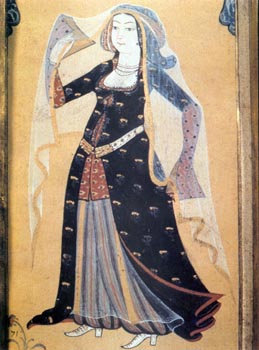
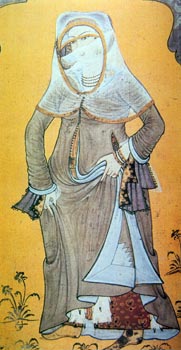
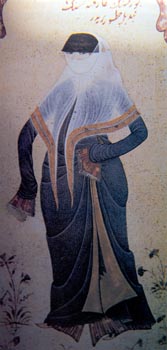









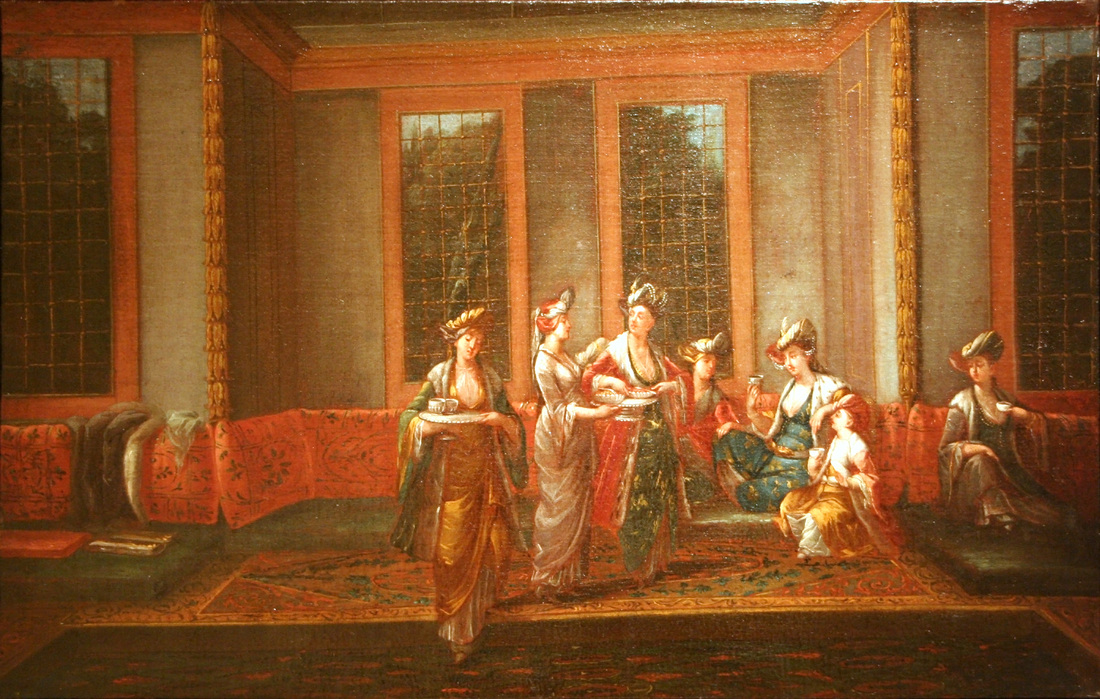

 RSS Feed
RSS Feed